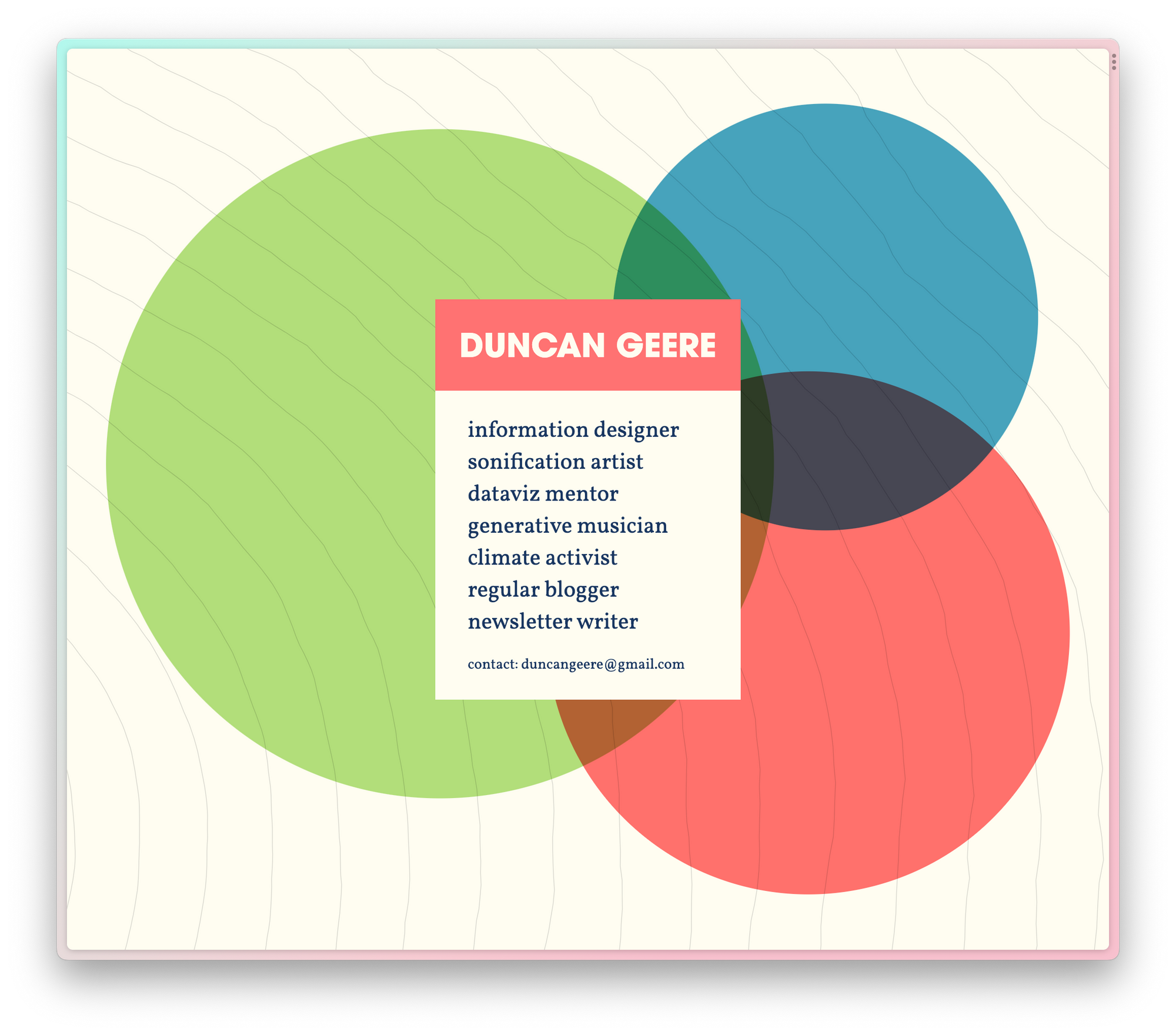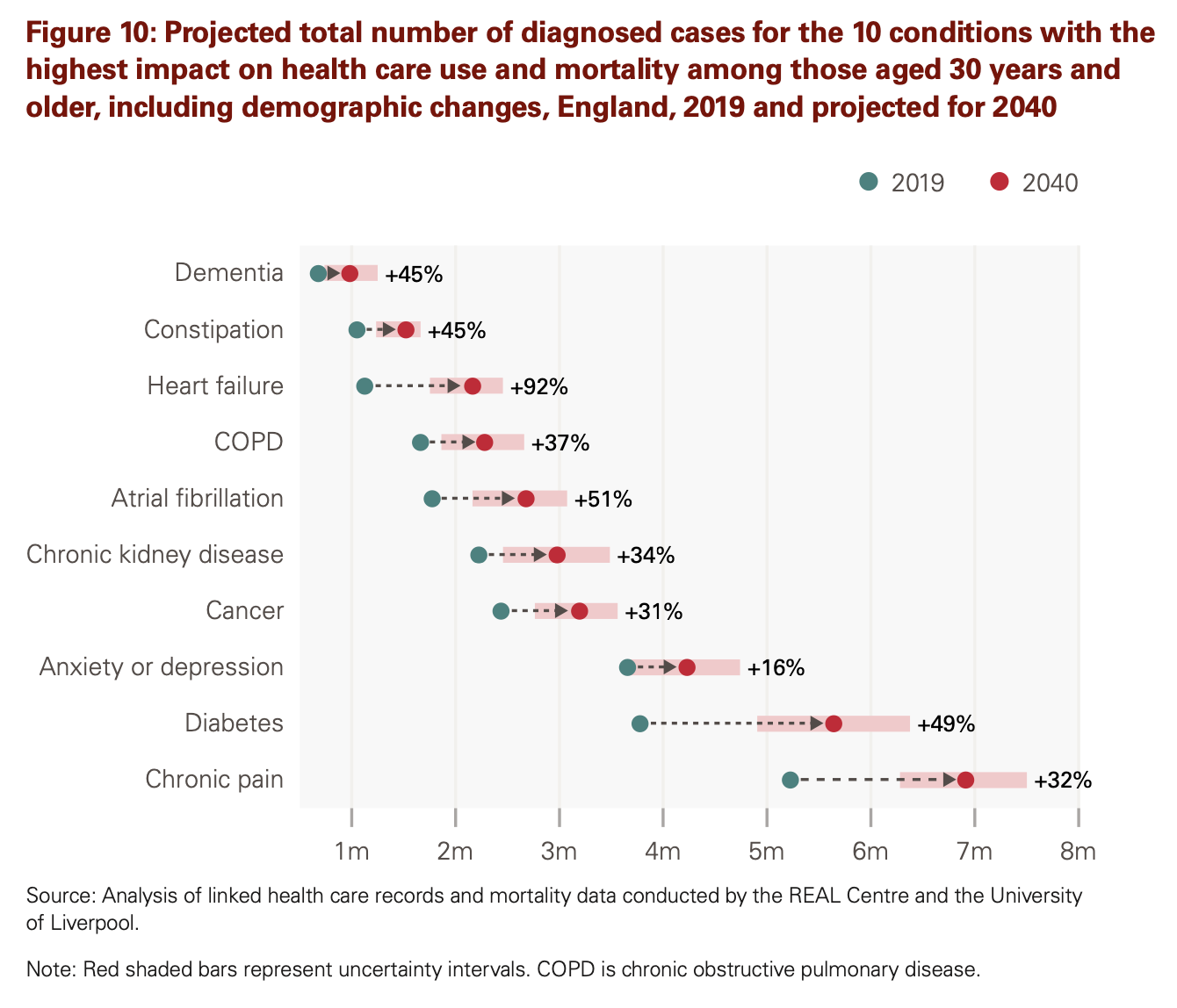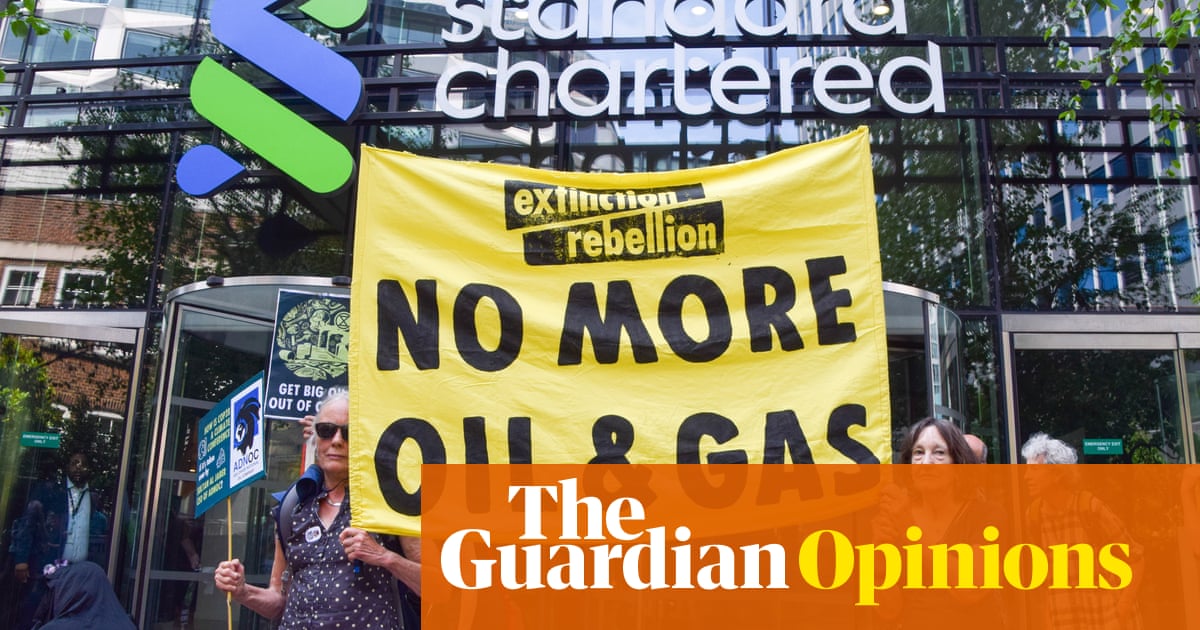Tenday Notes 21 July - 31 July 2023

Every ten days or so, I share a quick digest of what I've been working on and reading. Here's the latest. More in the series here.

I've just relaunched my personal website at duncangeere.com.
My goal was essentially to create an index that links to my other work across the rest of the web, and give people a place where they can see the "whole" of what I do and find my contact details.
I opted to go super-simple, writing up the HTML and CSS by hand in a couple of hours. In the past I've created quite complicated personal sites - this is the first time I've put simplicity at the top of the list. Makes it way easier to maintain and update over time.
I'm really happy with the results. Go take a look!

Late last year and earlier this year I did some dataviz consulting for the Health Foundation on a report showing how patterns of illness are projected to change in the next couple of decades. Here are the key points, which I'm quoting from the report itself:
- 9.1 million people in England are projected to be living with major illness by 2040, 2.5 million more than in 2019. This is an increase from almost 1 in 6 to nearly 1 in 5 of the adult population.
- Most of this rise is the result of an ageing population – as life expectancy increases and the baby-boomer generation reaches older age. While living longer is something to celebrate, this will have profound implications for the NHS, social care and other public services.
- We have known for some time that an ageing population increases the demand for health services. This report gives us an idea of the scale going forward. The challenges this creates are not unique to England or the UK – as many high-income countries are ageing at a similar rate.
- Much of the projected growth in illness relates to conditions such as anxiety and depression, chronic pain and diabetes, which are predominantly managed in primary care and the community. This reinforces the need for investment in general practice and community-based services, focusing on prevention and early intervention to reduce the impact of illness and improve the quality of people’s lives.
- The number of people living with major illness is projected to increase by 37% – over a third – by 2040, nine times the rate at which the working age population (20–69-year-olds) is expected to grow (4%). This would create additional pressures on us all to care for and fund a growing population with high health and care needs.

Want more? The full findings have now been published, with lots of good dataviz that the team created, so go check it out. Or, if you hate dataviz then go read the Guardian's coverage of the report's findings, which disappointingly features no visualization at all!
In case you were wondering how the "effective altruism" movement has been going lately:
The ultimate strategy, according to the memo, was “to purchase the sovereign nation of Nauru in order to construct a ‘bunker / shelter’ that would be used for some event where 50%-99.99% of people die [to] ensure that most EAs (effective altruists) survive.” The memo also mentioned to plans to develop “sensible regulation around human genetic enhancement, and build a lab there,” noting that perhaps “there are other things it’s useful to do with a sovereign country, too.”

Via Quartz.
My lil data sonification community, Decibels, just hit 250 members! If you're interested in hanging out with a bunch of lovely people who are turning data into music, then come join us: http://decibels.community.

I have been experiencing a lot of climate anxiety lately. It comes and goes, but having just lived through some of the hottest weeks that humankind has ever seen, it's really coming to a head at the moment.
What drives my anxiety isn't the news reports about "global boiling", but the total lack of any kind of serious response to those reports. Our leaders, on both sides of the political spectrum, nod vaguely and say that climate change is concerning, and occasionally set a target for far in the future, but they fail to put in place any policies or action to reach those targets.
It's like driving a bus, and seeing an approaching wall, and having your passengers point out that a wall is fast-approaching and that you really should slow down, and responding with a statement that you're putting in place a target that by 2050 we won't hit this wall, while keeping your foot firmly on the accelerator.
For a real-world example of this, just look at UK Prime Minister Rishi Sunak's new announcement that he's selling hundreds more oil and gas drilling licenses in the North Sea, while trying to simultaneously hold firm on the UK's pledge to get to net zero by 2050. You cannot have both of these things.
A couple of people who I've spoken to recently about my climate anxiety linked me to this recent op-ed by Rebecca Solnit about doomism and defeatism. It says a lot of things that are true - that the vast majority of the public support strong climate action, and that the electricity problem is on course to be solved through plunging renewable energy prices. It correctly states that people putting out a defeatist perspective demotivate others who might take action, and that change is non-linear.

But I didn't find it comforting in any way. Partly because it doesn't address my core concern about lack of political action, and partly because I'm not a doomist - I do believe that it's possible to avoid the worst effects of climate change with a swift and society-wide course correction, and that making that course correction carefully while looking after those it affects will lead to a better, fairer world.
Unfortunately, something being possible doesn't make it inevitable. Far from it. I'm hugely concerned that none of the policies being implemented by mainstream leaders anywhere in the world come close to matching the scale of the challenge. I'm even more worried that climate policy is increasingly being used as a wedge to divide people, rather than a shared cause to bring people together.
So I'll keep fighting, and I really hope you all will too - in whatever ways you can.
See you again in ten days.
- Duncan




